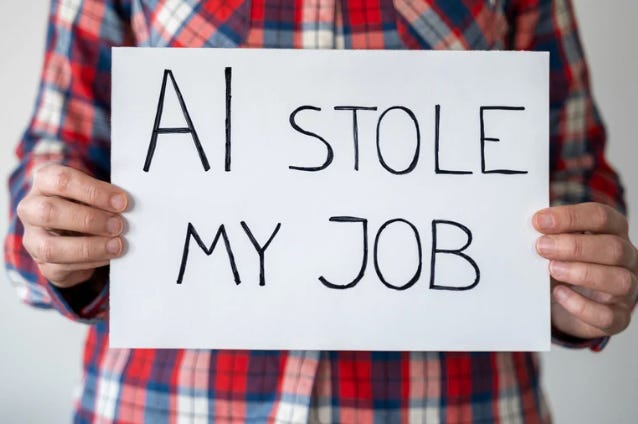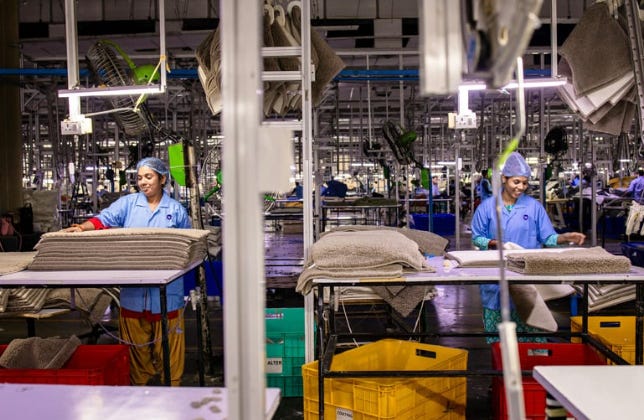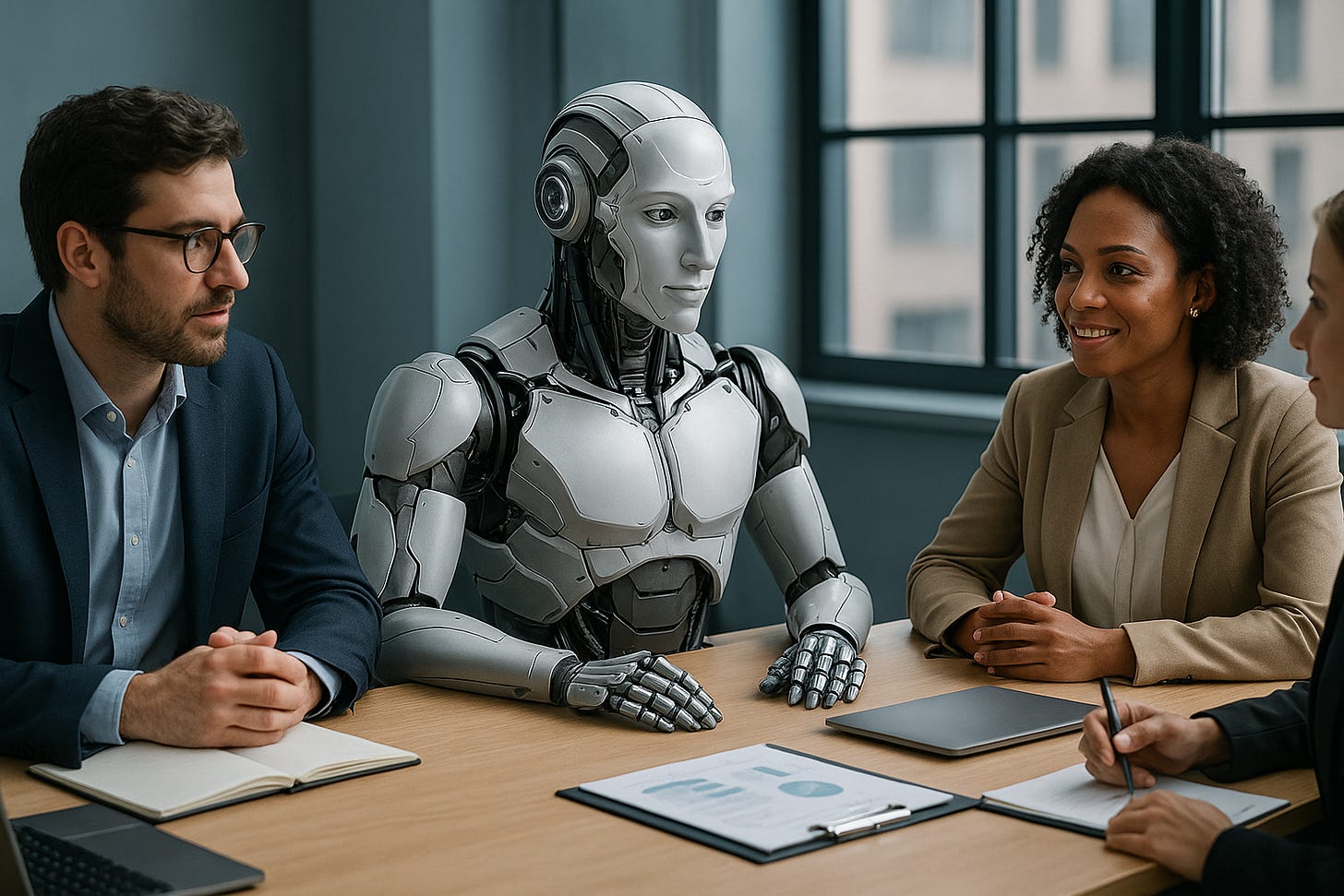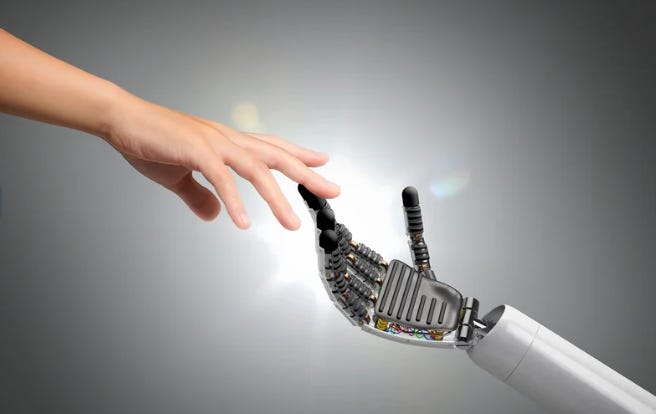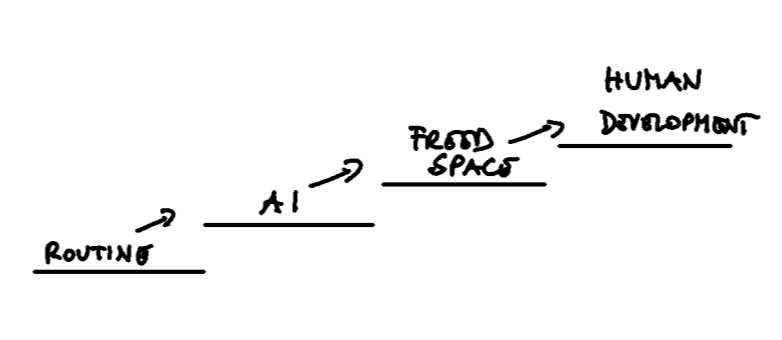AI Won’t Take Your Job. But Ignoring It Will.
People won’t lose jobs because of AI. They’ll lose jobs because of leaders who cling to old business models.
By 2030, AI could contribute $15.7 trillion to the global economy (PwC).
Accenture projects that 40% of working hours will be automated by 2035. And yet, 77% of organizations still lack an AI strategy (Gartner).
This is the paradox of our time: AI isn’t the enemy. Ignoring it is.
People won’t lose jobs because of artificial intelligence.
They’ll lose jobs because of human ignorance.
Part 1 – The Wrong Question
In boardrooms, I keep hearing the same worry: “Will AI replace us?”
That is the wrong question.
The real question is: What will we do with the space AI creates?
AI is not creative. It is predictive.
It recombines. It mirrors.
It does not imagine. It does not suffer. It does not dream.
The danger is not AI replacing us. The danger is leaders refusing to adapt.
AI won’t kill your company. Your refusal to reinvent will.
Part 2 – Solving Human Problems
For two centuries, progress trained humans to behave like machines.
Stand here.
Repeat this.
Don’t feel. Don’t question. Don’t create.
It was survival, not work.
AI ends that era.
It will consume repetitive, soul-killing labor. And it should.
Because folding shirts for 10 hours is not meaningful work. It is survival disguised as contribution.
The real frontier begins when the machine takes the routine away. It frees us to address human problems:
How do we reconnect in a distracted world?
How do we build presence in a hyper-stimulated society?
How do we restore relationships fractured by speed and scale?
How do we develop people into their full potential?
Machines can automate tasks. Only leaders can cultivate humanity.
Part 3 – The Return of Small Teams
The industrial age scaled through bureaucracy—layers of management, endless approvals, heavy processes.
Bureaucracy became a substitute for trust.
AI makes this model obsolete. It becomes the invisible co-worker:
Automating reports.
Handling compliance.
Eliminating administrative bottlenecks.
That means the most effective organizations will return to the smallest unit: the human team—autonomous, agile, responsible.
Not because hierarchy forces it, but because the system finally frees it.
Part 4 – The Co-Pilot Mindset
AI is your co-pilot. It does not replace the pilot; it enhances the pilot.
A co-pilot is useless without a destination—and only leadership can provide that.
If you don’t know your purpose, no algorithm will invent it.
If you don’t know where you’re going, no machine will fly you there.
Leaders who treat AI as a gimmick will fade.
Leaders who treat it as a co-pilot will fly higher.
AI can be your second brain. But only you can be the soul.
Part 5 – Education: The Next Collapse
The greatest risk is not in business, but in education.
Our schools still reward memorization—in a world where recall is irrelevant.
Our companies still promote hierarchy—in a world where networks dominate.
UNESCO estimates that 47% of today’s skills will be obsolete by 2030.
Ignore this and you don’t just fail your people—you sentence them to irrelevance.
The tragedy is not AI taking jobs.
It’s leaders refusing to reinvent education and development.
Part 6 – New Entrepreneurs Will Rise
History is clear.
The plow ended manual farming → new industries emerged.
The factory ended artisans → markets exploded.
The computer ended clerks → startups defined the new economy.
AI will repeat the cycle.
Yes, routine jobs will vanish.
But entrepreneurs will rise to solve problems we can’t yet name.
This is not the end of work. It is the expansion of the entrepreneurial world.
For the first time in history, humans are being freed from survival tasks—the repetitive, mechanical labor that machines can now handle. And what remains is space:
Space for imagination.
Space for creativity.
Space for design.
AI will take the routine. Humans must take the responsibility—to become human by design: consciously shaping businesses, systems, and societies that solve the problems we once ignored—loneliness, presence, connection, meaning.
This is the opportunity of our lifetime. Not just to build companies. To build futures worth living in.
If leadership is courageous enough to create the conditions.
Part 7 – AI and the Death of Boring Jobs
Let’s be honest: boring jobs were never real jobs.
Filing papers. Pushing buttons. Stamping documents. That was survival, not creation.
AI will automate them—and we should be grateful.
What makes us human is not repetition. It is imagination.
AI predicts. Humans imagine.
AI recombines. Humans invent.
The future is not AI vs. humans. It is AI + humans.
Prediction + imagination. Routine + creativity.
Part 8 – The Organisational Shift
Organisational design will change more in the next 10 years than in the last 50.
AI as the invisible co-worker.
Small teams as the core unit.
Leaders as curators of humanity, not controllers of process.
Work redefined from survival → self-actualization.
If you lead like it’s 1995, you won’t have a company in 2035.
AI doesn’t kill companies. Leaders who ignore it do.
Part 9 – Leadership as Human Mastery
Most leaders fear AI because they think it makes them less relevant. The truth is the opposite.
AI will make leaders more relevant—if they understand their real role.
Leadership was never about repeating processes or controlling outcomes.
Leadership is human mastery.
That means climbing a staircase:
Step 1 – Routine (The Old Economy)
For centuries, work was defined by repetition—farming, factories, filing. Leaders managed the routine.
But routine doesn’t need leaders anymore. It needs automation.
Step 2 – AI (The Invisible Co-Worker)
AI takes the load of the repetitive. It handles compliance, calculation, and prediction.
But AI cannot care. It cannot connect. It cannot create meaning.
This is where leaders step back in.
Step 3 – Freed Space (The New Resource)
Every routine AI automates creates freed space. That space is leadership’s raw material—where culture grows and human problems are solved.
A bad leader fills it with more tasks. A great leader fills it with imagination, dialogue, and trust.
Step 4 – Human Development (The True Work of Leadership)
At the top of the staircase is the real work. Not routine. Not process. Human development.
The final gift of AI is not efficiency. It is confrontation.
It will strip away every excuse. It will automate every illusion of productivity.
And it will leave us face-to-face with the truth:
The only work left is human work.
That means:
Emotional intelligence.
Creativity.
Trust.
Presence.
What managers once dismissed as “soft” is now the hardest edge of leadership.
AI automates routine. Leaders cultivate humanity.
Reflection Tool – The AI Audit
Three questions every leader must ask today:
What parts of my organization are still built on repetition?
What parts are built on relationships?
If AI removed every routine task tomorrow, how would we use the freed space?
Answer honestly. That’s your blueprint.
TL;DR
AI will add $15.7T to the economy by 2030 (PwC).
40% of working hours could be automated by 2035 (Accenture).
77% of companies still lack an AI strategy (Gartner).
UNESCO: 47% of skills obsolete by 2030.
AI doesn’t end work. It ends fake work.
Routine jobs vanish → entrepreneurs rise.
Bureaucracy dies → small teams thrive.
AI predicts. Humans imagine. That’s the partnership.
Final Words
AI is not the enemy. Ignoring it is.
It will automate every illusion of productivity—and force leaders to confront what is real.
Leadership is not about competing with algorithms. It is about becoming more human than ever.
Engage With This Idea
Comment: What part of your leadership could AI free to become more human?
Share: Send this to a leader who fears AI instead of using it.
Subscribe: Join 350+ leaders building a human-centered future with AI.
ATTENTION: Unlock Your Practice
Upgrade to paid. Make AI your co-pilot for human-centered leadership.
Inside the Playbook (8 pages):
The AI Audit Worksheet — map routine vs. human problems.
The Small Team Blueprint — structure lean, human-centered teams.
The Co-Pilot Journal — weekly prompts to align AI with purpose.
The Invisible Co-Worker Checklist — integrate AI into culture without losing humanity.
Paid subscribers also get:
Exclusive Playbooks & Journals (including the Influence & Awakening Journal).
Subscriber-only articles — deeper insights, frameworks, and case studies I never share publicly.
Full archive access — every past article and guide unlocked.
Direct community access — comment, ask questions, and get answers from me personally.
TODAY ONLY: SPECIAL OFFER — “LEADERS ARE READERS”
Get 20% off your first year.
Because leaders are readers — and the best leaders invest in their growth.




